Trump is definitely NOT anti-semetic. He wants to OWN the Jews. He wants JEWISH POWER since he smells their MONEY power.
EW YORK – Near the end of his debt-ridden ownership of the Plaza Hotel, Donald Trump summoned Abe Foxman to breakfast at its iconic Palm Court. The real estate tycoon had a bone to pick with the Anti-Defamation League.
Foxman, then ADL’s national director, sat waiting for half an hour at the owner’s usual corner table. Trump finally walked in blustering, hand outstretched...
“Mr. Foxman,” he began, “Trump never apologizes.”
Foxman’s colleague, Art Teitelbaum, had recently criticized Trump for his tactics in Palm Beach – a city long marred by discrimination – battling the city council over turning his estate at Mar-a-Lago into a private social club. Trump was accusing the Florida township of antisemitism, claiming that it was opposed to his efforts because his club was going to welcome members of all races and creeds, including Jews and African-Americans.
The ADL’s leadership had seen this phenomenon up close: Teitelbaum and Foxman were in the trenches fighting discrimination in Palm Beach already back in 1964. There was still antisemitism there three decades later, and they expected discrimination to persist. “But that has nothing to do with Trump’s plans to build at Mar-a-Lago,” Teitelbaum told members of the press at the time, suggesting Trump was using Jews as a negotiating ploy.
“Who the f**k is this guy, Teitelbaum?” Trump asked Foxman, according to a version of the 1994 conversation as recalled by the ADL leader. “Abe, it’s antisemitism. All my members will be Jewish.”
“Donald – that’s antisemitism,” Foxman said. “You don’t know who your members will be.”
Trump appeared shocked, and privately backed off his use of the term at Foxman’s explicit request. But Trump apparently did not understand the problem. In his mind, the caste of Jews was complimentary – if still a caste nonetheless.
“To say that only Jews will be members meant that only Jews have money – it was stereotypic,” Foxman recalled in a recent interview. “For him, it may have been an assessment of business opportunities. He’s a shrewd businessman.”
THROUGHOUT MUCH of his adult life and childhood, at seemingly every significant juncture in his business career, Donald J. Trump has surrounded himself with members of a single minority group.
His relationship with the Jewish community offers exceptional insight into the tolerance of a man whose unpredictable presidential campaign has been defined, by many, as one of the most culturally and racially divisive in modern American political history.
Over the course of a months-long investigation of that relationship by
The Jerusalem Post – resourcing court documents, media archives and original interviews with campaign aides, close personal confidantes, past lawyers, business partners and employees – both supporters and detractors of the Republican nominee agreed on one critical revelation: Trump seems to have something of an affirmative prejudice toward Jews.
They believe he considers Jews a group of rich, smart, successful and generally powerful deal makers – all traits which Trump himself aspires to, and has sought to emulate, while simultaneously touching on tropes described by historians of the topic as classically antisemitic.
“In some ways, Donald Trump and his relationship with the Jews is the latest chapter in a very long history of ambivalence and dichotomous relations,” Jonathan Sarna, author of
American Judaism: A History, said in an interview. “The line between philosemitism and antisemitism is often a difficult one – the line is thin. It’s not bright red. Often you can find within the same person both tendencies, and Trump is a study in that.”
‘Jews are the best tenants’
Trump Village on Coney Island was still an empty plot of sand when Sharon Glaser’s family signed up for an apartment on Fred Trump’s waiting list.
The Glasers were shown a model of what their unit would look like, and offered a list of planned amenities. “We had to put money down,” said Glaser, who moved into the property in 1964 and still lives there to this day. “It was mainly Jewish when we first moved in, but now it’s very mixed.”
The process for securing an apartment wasn’t hard for her Jewish family. “We met the requirements,” she said.
Fred Trump, founder of Trump Management and father and mentor to Donald, was personally involved at this stage of development. In interviews, residents said they would see him around often and that he maintained a good reputation in the community.
But at this point in his life, Fred, born of German immigrants, was publicly peddling a fabricated Swedish past. As has now been acknowledged by the Trump family, he was hiding his German heritage out of fear that it would deter critical Jewish contacts in the New York real estate world, as well as potential Jewish tenants interested in his properties.
And Jewish tenants were his preference.
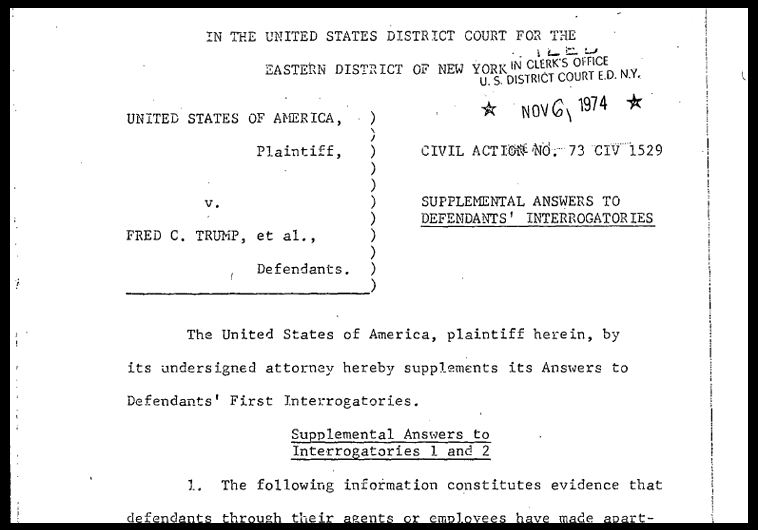
Documents from a Justice Department discrimination case against Trump launched in 1973 quote one of his rental agents describing a racial code: “Some blacks do live in Trump buildings,” the agent recalled in one March 6, 1974, district court filing, but “Trump Management believes that Jewish tenants are the best tenants.” Another agent was instructed to rent only to “Jews and executives” and to disregard the applications of blacks.
Facing one of the highest profile Fair Housing Act prosecutions in the country, the Trump family retained lawyer Roy Cohn, former chief counsel to Senator Joseph McCarthy during the Red Scare and Jewish himself. Fred and Donald were soliciting members of minority groups through an advertising campaign, Cohn insisted at the time. “We think the [
New York]
Times is geared to minorities. It supported a Puerto Rican for mayor against a Jew,” he noted.
A report in that very paper puts a young Fred, age 21, at a Ku Klux Klan rally in 1927 (Donald has denied this report refers to his father, but the arrestee’s police record accurately lists Fred’s old address in Queens). Archived newspaper coverage of Klan organizing efforts in New York City from that period records the group claimed itself neither to be “anti-Jewish” nor violent. But “our investigations have led to disclosures which convince us there is a sweeping Bolshevist and Socialist propaganda moving in large areas of the Jewish population,” the city’s Klan chapter head said in 1922, according to a
Times article. “We oppose movements of this kind.”
If Fred ever flirted with Klan recruiters, their dalliance appears to have been short-lived, as he proceeded throughout the rest of his life to work extensively with members of the Jewish community. And whatever prejudice Fred may have maintained against “colored” people, he demonstrated a consistent willingness to work with and befriend Jews beyond simply renting to them.
Fred was not the only Trump to allegedly fib about his heritage: Donald’s older brother, Freddy Trump Jr., joined a Jewish fraternity at Lehigh University in 1960, claiming to at least some pledgees that his father was part of the tribe, according to interviews with former fellow classmates. Donald himself kept up the story of his father’s Swedish ancestry until acknowledging German roots to
Vanity Fair in 1990.
Sarna said that Christian European immigrants to New York during this time were often torn between what they had in common with their Jewish European brethren, and what appeared to set them apart.
“Ambivalence is the right word,” said Sarna. “On the one hand, lots of German Americans had lots of Jewish friends in this period. And yet they were always different as Jews, and they knew that they were different – and at crucial moments, the two really came to be at loggerheads.”
Fred’s rise in New York real estate was intimately tied to the success of Abraham “Bunny” Lindenbaum, his longtime counsel, and Abe Beame, the first Jewish mayor of New York. Beame and Lindenbaum were old friends, and together worked on the approval of Fred’s cornerstone Coney Island project.
Stuart Oltchick, who knew the Trump family well and met Freddy Jr. in their Jewish fraternity days, said he frequently attended dinners with the Trumps and Sandy Lindenbaum, Bunny’s son.
“You’re not in Dubuque, Iowa, so a good part of what happens in New York City, commercially, is related to Jews,” said Oltchick, who described Donald’s father as a “reserved, well-dressed executive” who came from a “different time” when discrimination was acceptable business practice.
Oltchick told
The Post he remained close with Freddy Jr. until his sudden death at age 43 after struggling with alcoholism – an event that has turned Donald off of all substances. He describes their father as less reverential of blue-collar work than Donald expresses himself to be on the campaign trail: “When Freddy became a commercial airline pilot, his father called him a bus driver in the sky,” Oltchick recalled.
Fred donated generously to Beame’s election campaign, despite a conflict of interest later acknowledged by Donald, and to the campaign of Manfred Ohrenstein, majority leader of the New York State Senate and a critical contact for the Trump family on several other projects in proceeding years.
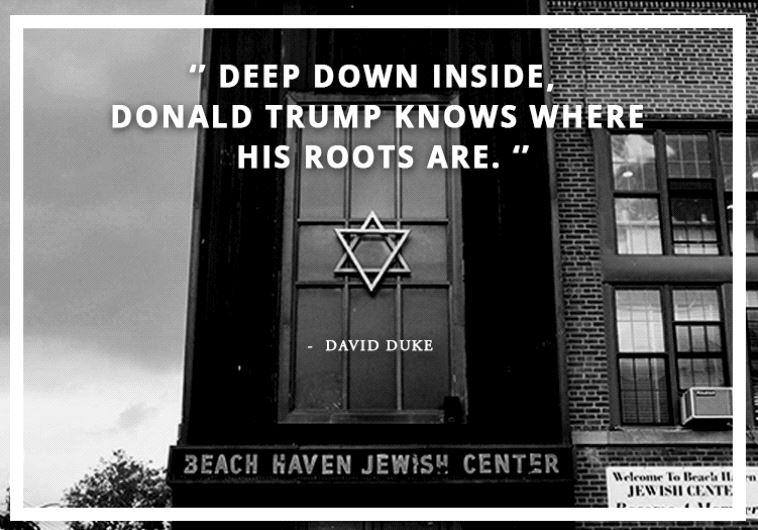
Racial integration at Trump properties was slow even after Cohn reached a settlement with the Justice Department, and Trump Village was still “just about all Jewish” when at least one resident, Charna Kaplan, moved in with her son in the late 1980s, as Donald was already moving on to Manhattan.
Donald came of age during this critical period in his father’s life, and assumed a leading role in Trump Management shortly before facing his first public test: the Justice Department case. He testified in 1974 that he personally handled leases in Brooklyn and Queens, which disproportionately awarded apartments to Jewish applicants. In a short period, he was building on his own, using some of the vital contacts his father had established. The Lindenbaums ultimately helped Donald forge into Manhattan real estate several years later.
The immediate circle around Trump as he entered Manhattan was full of Jewish figures and has remained so consistently ever since.
Donald’s father remained in the outer boroughs and died at Long Island Jewish Medical Center in 1999. Fred has been memorialized there in at least one venue: a Jewish center, built on a plot of land in Sea Breeze he donated to the Orthodox community in an act of apparent goodwill.
“Fred C. Trump, humanitarian,” a 1956 plaque in the Beach Haven building reads, “a sagacious person deserving of every plaudit and tribute given by our community, emphasized more so by the tumultuous age in which we live.”
‘I figured out how to use Jews to my advantage’
The Jerusalem Post first reported on Donald Trump’s presidential ambitions in 1999, when he floated himself as a potential candidate for the Reform Party of Ross Perot, Pat Buchanan and Ralph Nader.
By that time he was publicly known as a brash New York builder, a casino mogul and a twice-divorced tabloid magnet.
Trump kept loyalists around him throughout this period, when he carefully reconstructed the image of his father’s company based on his own personal brand as a shrewd deal maker.
“He surrounds himself oddly enough with Jewish personnel, both then and now: his real estate lawyer is Jewish, his house counsel is Jewish, his controller is Jewish, his chief of staff, chief financial officer, executive vice president, his first executive vice president – I was his litigator for 15 years,” Jay Goldberg, who worked for Trump from 1990 to 2005, said in an interview.
Goldberg navigated Trump through both of his divorces in the 1990s with Ivana Zelníková and Marla Maples. Aware of Fred’s past, Goldberg warned against holding deeds of the father against the son: “No attainder of treason shall work corruption of blood,” he said, quoting the Constitution.
“When we talk about the Jewish community and I really think about it, I can’t think of one Christian person on his senior staff,” said Goldberg, who will vote for Trump in November. “It’s amazing to me. It’s almost prejudice in favor of Jewish people.”
During their divorce proceedings, Ivana reportedly told her friend that Trump would jokingly “Heil Hitler” with his cousin – an allusion to their hushed German heritage – and that he kept a book of Adolf Hitler’s most successful propaganda speeches, titled
My New Order, on his bedside. When a
Vanity Fair reporter asked Trump to explain this in 1990, he referenced the wrong book. “It was my friend Marty Davis from Paramount who gave me a copy of
Mein Kampf, and he’s a Jew,” Trump asserted. The late Hollywood executive was not Jewish.
Several authors made hay of Trump’s star appeal, including John O’Donnell, who wrote a book titled
Trumped! that Donald said was generally accurate. One section of the book depicts him openly discriminating against people on the basis of their race, ethnicity and religion.
“I’ve got black accountants at Trump Castle and at Trump Plaza. Black guys counting my money,” Trump said, according to the 1991 biography. “I hate it. The only kind of people I want counting my money are short guys that wear yarmulkes every day.” Trump later denied making that comment.
Only one author spent extensive time with Trump, however, and that was Tony Schwartz, who embedded himself in Trump’s life for 18 months as ghostwriter of
The Art of the Deal.
Schwartz would often hear Trump talk about Jews – a group that he quintessentially characterized as shrewd accountants and lawyers, the writer said.
“The way I would describe his perception of Jews is that he thinks of them in very simple and very stereotypical terms,” Schwartz said in an interview. “My feeling was, ‘I figured out how to use Jews to my advantage.’”
Asked whether he ever thought Trump defined him by his affiliation with a group, Schwartz said he felt at the time that Trump thought of him as a “smart hustler Jew” who would probably write a solid book.
“It’s preposterous to think that Donald Trump has a deep personal understanding of or affinity with the Jewish community in the fullest sense of what that means,” Schwartz said. “And the reason I say that is that ‘affinity’ or ‘connection’ or ‘empathy’ or ‘deep understanding’ are not part of his vocabulary.”
Trump raised eyebrows with a Twitter message posted in April of 2013 which suggested that “outing” Daily Show host Jon Stewart as Jewish would indicate his level of intelligence.
“I promise you that I’m much smarter than Jonathan Leibowitz – I mean Jon Stewart, who, by the way, is totally overrated,” Trump tweeted at the time.
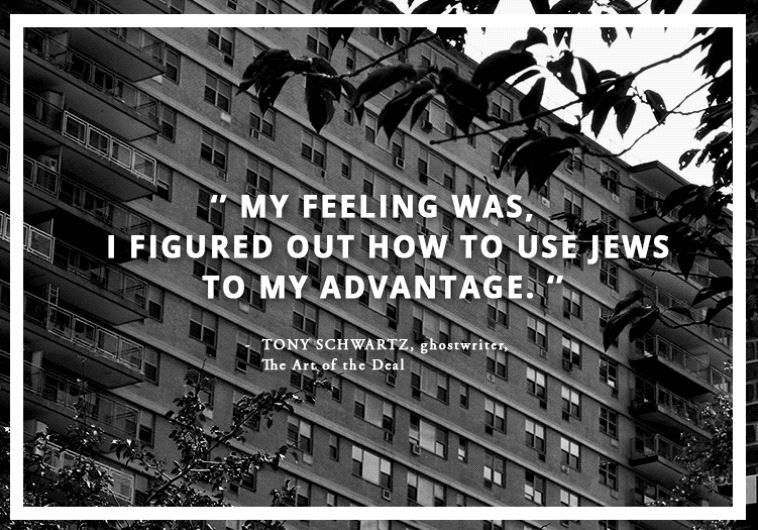
But Trump has also given generously to Jewish philanthropic organizations, including the Jewish National Fund and United Jewish Appeal, dating back to his very early career. Many of his donations and event appearances were quite private and went unrewarded – at least with publicity, a commodity Trump values enormously.
Trump often touts his connections to the community and hangs several Jewish awards prominently above his desk in Trump Tower, including JNF’s Tree of Life, awarded to him in 1983 for his fund-raising abilities, according to one longtime board member.
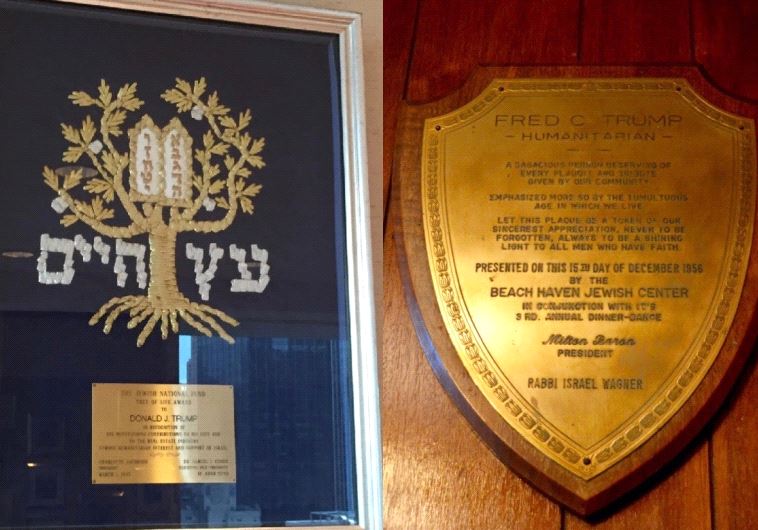
“I’ll have friends of mine come in [who are] Jewish and they’ll see the Tree of Life, and they’ll say, ‘wow, what a great thing,’” Trump told the
Washington Post last year. He lost the original award in his move to Mar-a-Lago and personally requested a replacement for his wall in 1997.
“Donald is clearly not an antisemite – he’s just neutral,” said a former senior Trump Organization employee, who requested anonymity due to the sensitivity of the topic. “He’s not a supporter of the community. If it’s to his advantage, then it works for him.”
‘Trump knows where his roots are’
The closest link Donald has to the Jewish community is not his staff, his business partners or his tenants, but his daughter, Ivanka, who converted to Judaism after three years of study in 2009.
Shortly after her engagement to Jared Kushner was announced that year, a friend of the family for over 20 years caught both Donald and Ivanka for a private moment on the sidelines of an important business meeting in Chicago.
Congratulations were offered; and knowing the Kushner family as Modern Orthodox, he asked her: Are you going to convert?
“He didn’t make a grimace in his face or raise his eyebrows or anything,” said Herb Kolben, who later attended their wedding with a “million-dollar”
huppa. “Donald told me he was entirely supportive.”
Jared and Ivanka declined requests to be interviewed for this article, as did her conversion rabbi, Haskel Lookstein, who said the Trump experience with Judaism was “a private matter for the family.” But the candidate’s top two advisers on Israel and the Jewish world, David Friedman and Jason Greenblatt, both sat down with
The Post to discuss what they described as Trump’s heartfelt, consistent and demonstrable commitment to the community.
“I don’t know where Jewish culture and New York culture begin and end,” said Friedman, who described a candidate with deep New York values. “There’s a lot of overlap there. And there’s a lot of that going on at the Trump Organization – fast talkers, quick thinkers, self-starters, motivated people.”
Friedman’s support for Trump is personal. Donald’s friend and lawyer for fifteen years, he took a genuine liking to his client roughly two years into their relationship, when Friedman’s father died.
In the middle of a blizzard, a ways outside the city, Friedman was sitting shiva when Trump suddenly showed up. Friedman was stunned. Trump was famous, and busy, and didn’t owe him anything.
“He came by, spent about an hour with me,” Friedman said. “We talked about my father and talked about his father – about how much of an influence his father had over him. And you know, there was nobody around. He wasn’t trying to prove anything to anybody.”
Greenblatt, executive vice president and chief legal officer at the Trump Organization, describes a workplace environment where he – and several other Sabbath observers – have been treated with nothing but respect.
“Deep down I think Donald has a Jewish heart,” said Greenblatt, who has attended services with Trump where he would hum along to Aleinu and stand and sit with the flow of ritual. “I wouldn’t say that he isn’t equally fond of non- Jews who share the same work ethic as his own. I think he’s very much an equal opportunity type of person.”
Greenblatt also remembers watching Donald as he listened, seemingly with appreciation, to the religious service at Ivanka’s wedding. Over the course of his capricious presidential campaign, the GOP nominee has discussed his daughter’s Judaism publicly with a sort of pride – as an example of his own personal tolerance, of his commitment to religious freedom, and to the security of Israel.
But at least one avid Trump supporter isn’t buying it.
“I don’t really use the term white nationalism, but I do want to preserve my heritage – just like Jews do,” said David Duke, a prominent white power activist, offering an explanation of why his worldview attracts him to the Trump campaign. “And I think deep down inside, Donald Trump knows where his roots are. He’s concerned about the general heritage of this country. The fact that some of his family is intermarried doesn’t really change that.”
Duke has become emblematic of a type of voter who, until this year, couldn’t find a horse to ride in the quadrennial race for the presidency. In the words of Trump’s rival, Democratic presidential nominee Hillary Rodham Clinton, these voters are in a “basket of deplorables” discriminating against people based on their race, gender, sexual orientation, place of origin and religion.
The sentiment that Clinton spoke of has jolted Jewish voters, who are frequently the targets of white supremacist attacks. Recent polls show Jewish voters supporting Clinton over Trump by over three to one.
“When Trump was asked about antisemitic slurs and death threats coming from his supporters, he refused to condemn them,” Clinton said in a speech on Trump’s relationship with the “alternative Right” movement, also known as the alt-Right, which generally opposes multiculturalism and immigration.
When Trump hired Steve Bannon, former head of the “platform for the alt-Right” website Breitbart.com, as his campaign CEO, campaign staff offered no comment when allegations of antisemitism from Bannon’s ex-wife surfaced days later. They were similarly quiet when Trump’s top foreign policy adviser, Joseph Schmitz, was found to be under investigation for trying to purge Jewish employees while at the Pentagon. And when Trump retweeted a graphic image of a six-pointed star pasted on a pile of money accusing Clinton of corruption, he ultimately deleted the post without ever acknowledging any problem with it – even after learning the image originated on a white nationalist website.
Duke rejects efforts to label him a white supremacist and to constantly evoke his past experience with the Ku Klux Klan as a coordinated smear campaign designed by the same “Jewish establishment media” that apparently has it out for his candidate.
Trump adviser Friedman says that Duke’s endorsement has “distressed” the presidential candidate. Indeed, both Trump and his vice presidential running mate, Indiana Governor Mike Pence, have disavowed Duke’s support on several occasions.
“I find it comical that David Duke thinks that he’s aligned with Donald, because Donald stands for everything that I think that David would abhor – tolerance, religious freedom, diversity, equal opportunity. That’s who Donald is,” Greenblatt said of Duke’s commentary for this article. “I think they are worlds apart.”
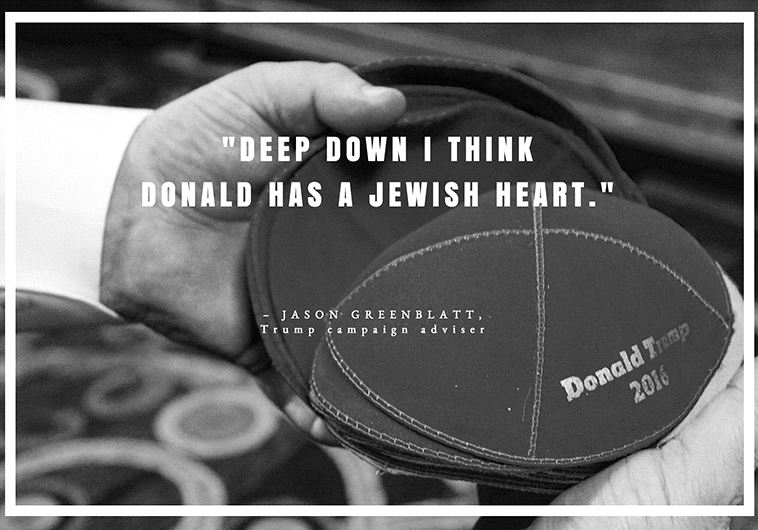
But Trump’s rhetoric on the campaign trail of late has enthused Duke and his ilk: “Our Christian heritage will be cherished, protected and defended like you’ve never seen before,” Trump told a summit of value voters on September 9.
“It would be very important, wouldn’t it, for a German American gentile to go to Jewish funding drives and charities and to build those relationships in order to navigate a society of Jewish nepotism ,” Duke said, describing the business tactics of Fred and Donald as an “astute” navigation of Jewish sensibilities in a city gripped by “immense” Jewish power. “The Jewish establishment wants massive immigration in this country, an interventionist, it wants gun control – that’s why they hate Donald Trump.”
Kushner has offered few media opportunities despite occupying a critical role in the Trump campaign: he helps run its daily operations, and penned the first teleprompter speech of Donald’s political career, delivered at the American Israel Public Affairs Committee (AIPAC) Policy Conference.
But Kushner felt compelled to address accusations of antisemitism against Donald, after the six-pointed star post went viral.
“My father-in-law is not an antisemite,” Kushner wrote in a newspaper column in July. He called Trump a loving and tolerant person whose embrace of his family’s identity has been “unwavering and from the heart.”
Toward the end of an hour-long interview, Duke put himself in Trump’s shoes to comport his perspective with the candidate’s lifelong relationship with the Jewish community.
“ ‘I’m going to be quiet,’” Duke surmised of Trump’s thinking, “’I’m going to gain as much power as I can, and when the time comes, I’m going to do what I can for my people. ‘”
Trump voted in the Republican primaries at Central Synagogue in Midtown. He won the state of New York, but lost Manhattan.
‘Affirmative prejudice’
Trump has made a handful of appeals to the Jewish community since announcing his presidential run, but most of them have resulted in one controversy or another.
“I’m a negotiator like you folks,” Trump said in a speech to the Republican Jewish Coalition in December. Campaign aides said the speech was geared toward business executives (it was not). “Is there anybody that doesn’t renegotiate deals in this room? This room negotiates them – perhaps more than any other room I’ve ever spoken in.”
At a group interview with Jewish reporters four months later, Trump looked around his conference table, saw several “Orthodox faces,” and “summoned some Orthodox Jews of his own to the room,” JTA reported at the time. “I’ve had many, many friends over the years Orthodox, in fact people that work for me,” Trump said. Jared and Ivanka sent their regards.
Friedman doesn’t see anything wrong here.
Posted - March 17, 2019